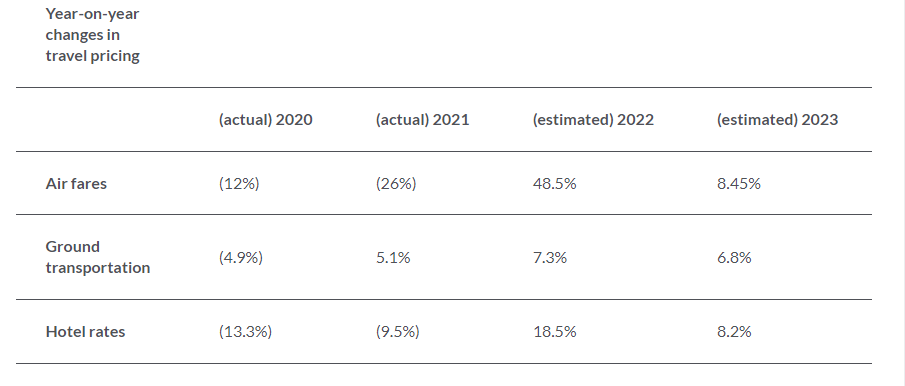South African businesses will not be immune from the escalating costs of business travel, which the Global Business Travel Association (GBTA) has predicted will continue to rise sharply for the remainder of 2022 and the entirety of 2023.
The organisation’s 2023 Annual Global Business Travel Forecast, which examines costs across the world, predicts that 2022 will see a full year average increase of 48.5% in airfares, 18.5% in hotel rates and 7.3% in car-rental charges. In 2023, airfares are expected to rise by 8.4%, hotel rates by 8.2% and car rentals by 6.8%.
“Rising fuel prices, labour shortages, and inflationary pressures in raw material costs are the primary drivers of the expected price growth,” according to the report, which uses anonymised data generated by B2B travel management platform CWT and the GBTA, with publicly available industry information and econometric and statistical modelling from the Avrio Institute.
“Demand for business travel and meetings is back with a vengeance, of that there is absolutely no doubt,” said Patrick Andersen, CWT CEO.
“Labour shortages across the travel and hospitality industry, rising raw material prices, and greater awareness for responsible travel are all having an impact on services, but predicted pricing is, on the whole, on a par with 2019.”

Glenton de Kock, CEO of SAACI, said South African businesses would have to prepare to tighten their belts in line with the rising cost of living.
“Overall cost of living has significantly impacted daily life for all. In the South African travel context we are seeing this impact on our domestic airlift capacity for certain routes, which makes access to destinations that have great product offering challenging right now,” said De Kock, who suggested that government should provide improved business travel incentives.
“We do need to consider, as Destination SA, how we deal with this and how all partners in the value chain work on managing current and any future rise in costs. The time has arrived for improved government incentives for the sector as the economic and social impact of business travel impacts many aspects of the South African economy.”
Key findings in the Global Business Travel Forecast
- In the MICE sector, the cost-per-attendee for meetings and events in 2022 is expected to be around 25% higher than in 2019 and is forecast to rise a further 7% in 2023. The rise is being driven by pent-up demand, a desire to build company culture and an uncertain economic outlook, along with event lead times shortening from one to three months versus six to 12 months.
- In Europe, the Middle East & Africa, hotel rates are expected to rise by 31.8% from the beginning of 2021 to end-2023 – driven by an accelerated recovery coupled with continued capacity constraints. Increases were initially driven by strong leisure travel, but improving group travel for corporate meetings and events is putting further pressure on average daily hotel rates.
- A rising share of premium-class tickets will result in higher average fares as the average ticket price comprises economy and premium. Premium-class air tickets comprised over 7% of all tickets purchased in 2019, falling to 6.5% in 2020 and 4.5% in 2021, but recovering to 6.2% in the first half of 2022.
- The car-rental industry remains capacity constrained and rental agencies that reduced fleet sizes in the wake of the pandemic have not yet fully recovered. Skyrocketing fuel prices, vehicle shortages and the need for visibility into carbon emissions from door-to-door are driving corporate travel managers to factor ground transport into full trip planning.






















